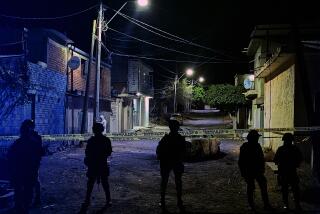Pope, Citing Islam, Criticizes Holy Wars and Fanaticism
Pope Benedict XVI stepped into the volatile realm of religious violence Tuesday, warning that fanaticism was “contrary to God’s nature” and quoting a historical criticism of Islam likely to inflame tensions in the Muslim world.
Speaking to academics at the University of Regensburg, where he taught theology in the 1970s, the pope traversed centuries of Islamic, Greek and Christian philosophy to decry holy wars and forced conversions, and to hold up Christianity as the “profound encounter of faith and reason.”
The pontiff’s lecture was long, dense and subject to wide interpretation. Rather than criticize Islam directly, he cited a Byzantine emperor’s harsh condemnation of Islam, its founder Muhammad and holy war.
Benedict used the word jihad, choosing the emotionally and politically loaded Arabic term for holy war or struggle.
“Violence is incompatible with the nature of God and the nature of the soul,” Benedict said. “Not to act in accordance with reason is contrary to God’s nature.”
In contrast to fanatic abuse of religion, the pope said, in Christianity “the fundamental decisions made about the relationship between faith and the use of human reason are part of the faith itself.”
Ultimately, the pope’s long exposition was not about Islam but about his favored themes: the dangers of secularism in the Christian West and the need to better know God, as well as the wish to open “genuine dialogue” among faiths and cultures.
But the remarks on Islam, however couched, were likely to draw the most attention.
Benedict’s disdain for radical Islam, and the use of religion to justify terrorism, is well known. Last year, during his inaugural trip as pope -- to Cologne, Germany -- he chastised Muslim community leaders for failing to steer young people from “the darkness of a new barbarism,” and he has asserted the fundamental importance of Europe’s Christian roots and character.
In November, Benedict is scheduled to travel to Turkey, a Muslim nation and a candidate to join the European Union, in what promises to be a prickly expedition.
At the university in this medieval city, on the fourth day of a six-day tour of his native Bavaria, the pope quoted Byzantine Emperor Manuel II in conversation with “an educated Persian”: “Show me just what Muhammad brought that was new, and there you will find things only evil and inhuman, such as his command to spread by the sword the faith he preached.”
Departing from his prepared text, the pope twice reminded the audience that he was quoting someone else, an indication that he was aware of the sensitivity of the comments.
Manuel II was speaking at the end of the 14th century in Constantinople. It was a time of great tumult between the Christian and Muslim worlds and about 50 years before the fall of the city, then the capital of eastern Christendom, to the Muslim Ottomans.
The pope said the emperor would have been aware of the Koran’s instructions on the waging of holy war as he argued that the spreading of the faith through violence was “something unreasonable.”
Father Federico Lombardi, the pope’s spokesman, said Benedict was not attacking Islam but highlighting forced conversions and holy war as historical examples of the violent use of religion.
The pope “does not want to give an interpretation of Islam as something violent,” Lombardi told reporters. “We know that inside Islam there are many different positions, not only violent but nonviolent too.”
Benedict, the consummate professor, chose his words carefully. Whether he intended a more overt criticism or was provoking intellectual debate was not clear. During his 17 months as pope, Benedict has displayed a sharp intellect and deep theological grounding, but not always the keen geopolitical ear of his predecessor, John Paul II.
In comments earlier Tuesday during an outdoor Mass at a Regensburg sports field, with more than 200,000 people in attendance, Benedict foreshadowed some of the themes in his university lecture.
Christians, he said, must learn to recognize the “pathologies and the life-threatening diseases” that undermine their faith and “the ways that God’s image can be destroyed by hatred and fanaticism.” It is important, he said, “to proclaim confidently that this God has a human face.”
Dressed in golden vestments and preaching from a large white altar, Benedict also used the Mass to revisit his stance on creation and evolution, alluding to what he called “creative reason,” which suggests that the formation of the universe was more than a “mathematically ordered cosmos.”
God “is our origin and future,” he said. “When God is subtracted, something doesn’t add up for man, the world, the whole vast universe.... With this faith we have no reason to hide, no fear of ending up in a dead end.... God does not leave us groping in the dark.”
*
More to Read
Start your day right
Sign up for Essential California for news, features and recommendations from the L.A. Times and beyond in your inbox six days a week.
You may occasionally receive promotional content from the Los Angeles Times.







